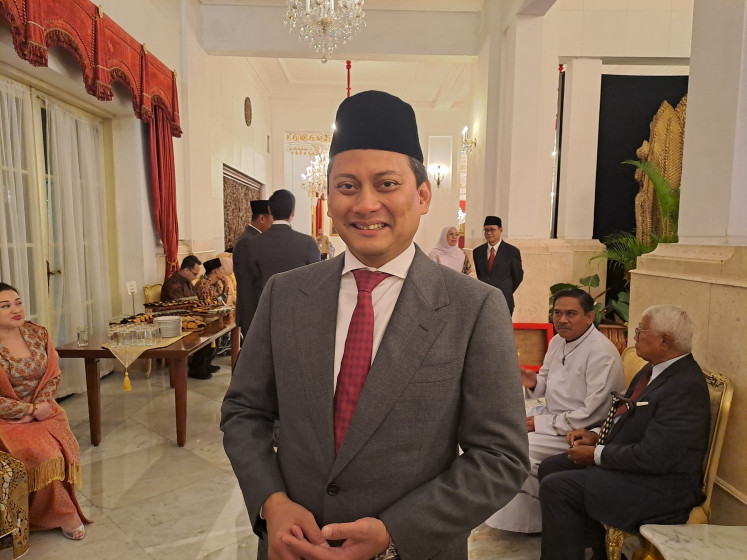Popular Reads
Top Results
Can't find what you're looking for?
View all search resultsPopular Reads
Top Results
Can't find what you're looking for?
View all search resultsTapanuli farmers take lead in sustainable landscapes drive
In the highlands of South Tapanuli, 800 meters above sea level, small-scale farmers are being trained to improve their rubber-tapping practices
Change text size
Gift Premium Articles
to Anyone
I
n the highlands of South Tapanuli, 800 meters above sea level, small-scale farmers are being trained to improve their rubber-tapping practices. They slice the 7- to 8-millimeter-thick bark of their rubber trees in an upward slant. This cuts through the underlying latex vessels more efficiently. This method taps more of the milky sap than their previous method of running their tapping knives in a downward diagonal thrust.
Also in this same district in the southern section of North Sumatra, growers of the organic Sipirok coffee use compost as fertilizer. The coffee beans are not spread on the ground for drying but are placed on wood-frame racks with a fine-wired mesh for the rack floor 30 centimeters above the ground.
Meanwhile, one farmers' group an hour's drive away uses a 'rocket stove' made of firebreak brick. It cooks up to 500 liters of nira, the juice of the sugar palm, taken from the flower stalk of the aren (the areca palm plant). The juice is heated to make one-kilogram cakes of hard brown sugar. Through another heating process in a kiln, a light-brown, granulated version of the palm sugar called gula semut (ant sugar) is produced.
These three agro-based smallholder activities have a common dual purpose. The first is to improve the local people's livelihoods and the second is to protect the environment by not over-exploiting the land. The environmental organization, Conservation International (CI), is cooperating with the local district government and small-scale farmers in a program called the Sustainable Landscapes Partnership.
Low productivity and low quality were the issues for the smallholder rubber planters. CI facilitators came in and held coaching clinics to show how best to increase the market value of impurity-free production. The link to sustainable landscapes is that the farmers improve their rubber output on old trees and do not need to plant seedlings in newly cleared space.
'Cutting upwards from right to left 3 meters above the ground cuts more of the capillary vessels so it produces more latex,' explains Ali Marwan, 43, a local rubber farmer and trainer since 2009 in the Marancar district.
In cooking the palm sugar, heat efficiency is achieved with the use of the rocket stove. It is called that because the flame it produces is concentrated like a rocket flame and is not wasted. The technology comes from North Sulawesi. Stove makers from that eastern province came to build the stove for the farmers' group in the district of Arse.
The sustainable landscape achievement here is that less firewood is used than before. Previously, individual farmers could only cook up to 20 liters of palm sugar syrup at a time over an inefficient open-pit fire.
Now the higher capacity rocket stove allows members of the farmers' group to have their individual yields cooked together.
Sutan Karyaman Pane, 66, a white-haired local farmer who grows 100 aren plants, only beamed with an enigmatic Cheshire cat smile when asked about his future prospects with the rocket stove.
On coffee growing in Sipirok district, the score for sustainable landscapes is that the growers do not use chemical fertilizer that could kill the natural nutrients in the soil.
Sipirok coffee is known for its aren flavor as the plants also grow in the area. 'Coffee beans are hydroscopic, susceptible to their surroundings. If the beans are laid on the ground to dry, they would absorb an earthy taste,' Sohli Pohan, 34, a local coffee shop owner, explains. This is why growers in Sipirok dry the beans on racks above the ground for the beans to maintain their natural flavor.
Sustainable landscapes is a global issue. The Global Landscapes Forum (GLF) met on the sidelines of the past two annual meetings of the United Nations Conference on Climate Change in November 2013 in Warsaw and December 2014 in Lima. The concept of sustainable landscapes calls for an integrated approach in the management of different geographical areas.
Thus, a forest, peat swamp and agricultural space in a given large expanse, for instance, should not be managed as separate, stand-alone areas, since they have interlinked properties. Such efficient management in a holistic manner is crucial to deal with life-changing challenges, such as climate change and sustainable development.
The 2014 GLF in Lima underscored in its outcome statement that 'a very large part of the climate and development solutions will have to be found in landscapes. Landscapes hold the solutions for livelihoods for billions, food for everyone, diversity and protection of nature and the foundation of the green economy.'
The importance of landscapes could figure in two landmark global agreements to be born later this year. In September, the United Nations General Assembly is to adopt the Sustainable Development Goals to replace the Millennium Development Goals that end in 2015.
Meanwhile, Jakarta will play host to a tropical landscapes summit called 'A Global Investment Opportunity', on April 27 and 28, which is organized by the United Nations Office for REDD+ Coordination in Indonesia.
In December, the UN climate conference meets in Paris. It is to issue a global, legally binding agreement to reduce carbon emissions to curb global warming. The accord, still unnamed, is to apply to all the world's nations. It replaces the 1997 Kyoto Protocol that only obliged developed countries to reduce greenhouse gases.
In the run-up to those global agreements, Tapanuli farmers take the lead to ensure sustainable landscapes.
________________
The writer, who teaches at the Dr. Soetomo Press Institute (LPDS), Jakarta, is a senior environmental journalist.










